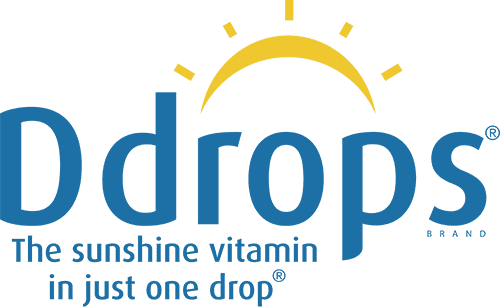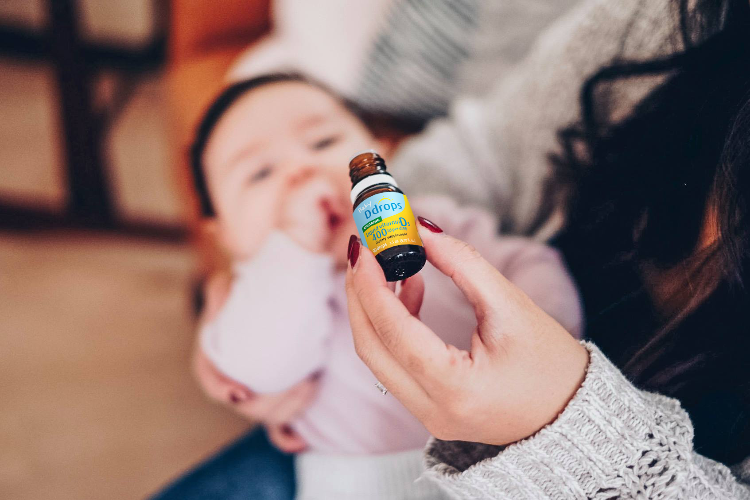The reasons why a baby should be breastfed are numerous and they vary depending on who you ask. Many new moms choose to breastfeed because it offers complete nutrition that is easy for the baby to digest, is inexpensive, and easy for the mom to provide. Pediatricians recommend breastfeeding because it has a wide range of health benefits and provides vital nutrients that meet a baby’s crucial growing needs. Some health benefits that are associated with breastfeeding are the prevention of respiratory illnesses; ear and throat infections; digestive problems; and allergies including asthma, eczema, and atopic dermatitis, just to name a few. [1]
Vitamin D dose recommendations for babies
In order for breastfed babies to receive enough vitamin D to meet their growing needs, the American Academy of Pediatrics (AAP) and the Canadian Paediatric Society (CPS) recommend a daily intake of 400 IU beginning in the first few days of life.[4] The CPS is advocating for an increase of vitamin D intake of 800 IU/day for Natives living in northern communities.[3] However, according to Dr. Steven Abrams, a Professor of Pediatrics at Baylor College of Medicine, most babies aren’t receiving a supplement. He indicates that “only 10 to 20 per cent of babies who are breastfed are also given a vitamin D supplement”.[4]
Babies need vitamin D
Are low levels of vitamin D that big of a deal? The answer is yes. Getting enough vitamin D is crucial during a baby’s first year when they are growing rapidly. Vitamin D is essential for the normal growth and maintenance of healthy bones and teeth.[5] It helps the body absorb calcium and phosphorus, which are vital for growing bones and teeth. Without enough, bones can become weak or soft, and babies may even develop rickets, which can lead to abnormally developed bones.[6]
Considering that infancy and childhood represent important periods of rapid growth, healthcare practitioners are looking carefully at vitamin D in these groups. Pediatricians like Dr. Abrams are seeing more health issues related to vitamin D deficiency and are concerned that there is a “mini epidemic” of deficiency in U.S. infants. He reports that a daily supplement of 400 IU of vitamin D has been shown to prevent problems related to vitamin D deficiency for almost 100 years and should continue to be used today.[7]
Is it possible for breastfed babies to get enough vitamin D naturally?
Typically, the answer is no. The best way for babies to naturally get vitamin D is through direct sunlight exposure. However, the FDA and the Canadian Dermatology Association recommends keeping infants under 6 months of age out of the direct sun, especially between the hours of 10 a.m. and 2 p.m.[8] This is when UV rays are the most harmful (but when the vitamin D absorption rates are the highest).[9] When babies 6 months or older are outside in the sun, it is recommended that they have on sunblock to prevent sun damage, which limits vitamin D absorption. All of this makes it very difficult for babies to receive enough of the vitamin naturally.
Babies and vitamin D supplements
A vitamin D supplement is so important for infants and children. We think our Baby Ddrops® is the best way to give your breastfed baby the vitamin D they need. They are tasteless, odorless, free from most common allergens, and contain the recommended dosing of 400 IU in just one drop.
This post was updated in August 2019. Updates and edits by Carrie Noriega, MD, FACOG, and Natalie Bourré, B.Sc., M.B.A.
- [1]“Breastfeeding Initiatives.” American Academy of Pediatrics. American Academy of Pediatrics, n.d. Web. < >
- [2]Quinn, Barbara. “Fortify Breast Milk with Vitamin D.” The Daily Herald. N.p., 27 May 2014. Web.
- [3]Canadian Paediatric Society. Vitamin D supplementation: Recommendations for Canadian mothers and infants. Posted Oct 1 20017. Last updated: Jan 30 2017.
- [4]Abrams, Steven A., MD. “Vitamin D Intake in Healthy Infants.” JAMA Network. JAMA Network, 1 May 2013. Web. 16 July 2014. .
- [5]“Dietary Reference Intakes for Calcium and Vitamin D.” The National Academies Press. 2011. Web. .
- [6]“Rickets: MedlinePlus Medical Encyclopedia.” U.S National Library of Medicine. U.S. National Library of Medicine, 1 Aug. 2012. Web. .
- [7]Abrams, Steven A., MD. “Vitamin D Intake in Healthy Infants.” JAMA Network. JAMA Network, 1 May 2013. Web. 16 July 2014.
- [8]Canadian Dermatology Association. Sun Safety for Every Day. 2019.
- [9]“Should You Put Sunscreen on Infants? Not Usually.” U.S. Food and Drug Administration. U.S. Food and Drug Administration, 6 May






Leave a comment
This site is protected by hCaptcha and the hCaptcha Privacy Policy and Terms of Service apply.